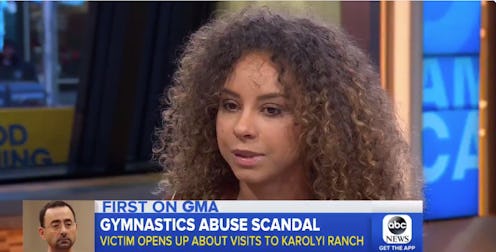News
How Mattie Larson Tried To Escape Larry Nassar’s Abuse Will Make You So Freaking Sad
Retired gymnast and former national champion Mattie Larson went to extreme lengths to avoid Larry Nassar and the toxic competitive environment that sustained and enabled him. The day after Nassar was sentenced to up to 175 years in prison for abusing underage girls, Larson revealed that to escape Nassar's abuse herself, she'd once faked a concussion so that she could put off her return to gymnastics training.
Like other elite gymnasts, Larson often trained at the Karolyi Ranch in Huntsville, Texas, originally run by Bela and Martha Karolyi. It was there that she says Nassar first abused her, and it was "The Ranch" that she said she was was trying to avoid by faking a concussion.
"It wasn't even a hard decision in my mind. I just turned on survival mode," Larson told Good Morning America host George Stephanopoulos on Thursday.
Larson said she was 15 or 16 years old when she decided to hit her head as hard as she could against the bathroom wall in her home, making sure she did so hard enough to give herself a visible lump. Then she made up a story about how she'd slipped on water from the bathtub and fallen down.
Larson minced no words in her statement to Nassar during his sentencing hearing in Michigan. But she extended blame to the entire USA Gymnastics organization for the abusive environment she said she experienced.
With her lawyer, Johny Manly, by her side, Larson said she wants to know "how this could have possibly happened." Manly, meanwhile, called for a full investigation of the Karolyi Ranch. (USAG severed ties with the Karolyi Ranch on Jan. 18.)
The roles USAG and Michigan State University played in keeping Nassar in power are becoming the next focus for many of Nassar's sexual abuse victims. Rachael Denhollander, the first to file a police report against Nassar in 2016, has been frank about what she sees as a culture of enablement and victim-silencing that USAG and MSU cultivated.
"Why could Nassar get away with sexually abusing little girls for so very long?" Denhollander asked. She said USAG and MSU failed "abhorrently" in protecting the women and children who came through their organizations.
"It's the biggest sexual assault scandal in history, and we should want to know why it happened. And if we don't, it's not going to get better," Denhollander promised. This attitude is shared by Larson in her demand for an investigation into Karolyi Ranch.
Larson is also pushing lawmakers to pass legislation that would make it mandatory for amateur athletic organizations to report abuse.
Along with other gymnasts, Larson met with Sen. Diane Feinstein a year ago to share her story and advocate for the need for stricter reporting laws governing organizations like USAG. The resulting Senate bill would require such institutions to report allegations of sexual abuse to the police. It also mandates a third party entity for victims to report abuse to, in the hopes of avoiding any conflicts of interest.
Larson then went to the House in November and testified before members, recounting her own experience with Nassar and urging them to vote on the legislation as soon as possible. The House has yet to vote on the bill.
Larson inveighed against the system she and countless other victims suffered under. Citing the extreme isolation of the Karolyi Ranch, with its 2,000 acres and lack of cell phone service, Larson said she and other athletes were forced to practice for hours without breaks for food or water. According to Larson, winning gold medals came before the health or well-being of the young girls and teenagers in the care of coaches and other staff at the Karolyi Ranch.
Olympic gold medalist Aly Raisman shares Larson's anger towards USAG. In a Twitter post, she wrote in support of Larson:
USAG has forever manipulated us to feel guilty and worthless when we don't win gold medals. That time is over.
Raisman has also been vocally critical of USAG, and along with Larson and Denhollander, is leading the public demand for these organizations and responsible individuals within them to be held accountable.
